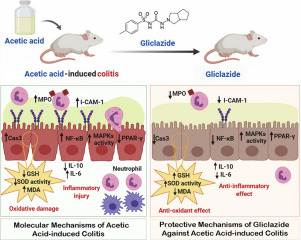当前位置:
X-MOL 学术
›
Toxicol. Appl. Pharmacol.
›
论文详情
Our official English website, www.x-mol.net, welcomes your
feedback! (Note: you will need to create a separate account there.)
Gliclazide attenuates acetic acid-induced colitis via the modulation of PPARγ, NF-κB and MAPK signaling pathways.
Toxicology and Applied Pharmacology ( IF 3.3 ) Pub Date : 2020-02-08 , DOI: 10.1016/j.taap.2020.114919 El-Shaimaa A Arafa 1 , Wafaa R Mohamed 2 , Dana M Zaher 3 , Hany A Omar 4
Toxicology and Applied Pharmacology ( IF 3.3 ) Pub Date : 2020-02-08 , DOI: 10.1016/j.taap.2020.114919 El-Shaimaa A Arafa 1 , Wafaa R Mohamed 2 , Dana M Zaher 3 , Hany A Omar 4
Affiliation

|
Ulcerative Colitis is a universal autoimmune disease with high incidence rates worldwide. It is characterized by the existence of many other concurrent immune-associated ailments, including diabetes. The used strategies for the management of this highly costing and complicated disease face great challenges. Therefore, the urge for new medication with fewer side effects and high efficacy is growing. The peroxisome proliferator-activated receptor-gamma (PPARγ) and nuclear factor Kappa-B (NF-κB) can be considered as crucial targets for the treatment of ulcerative colitis. Several studies reported the antioxidants, anti-inflammatory, and antiapoptotic actions of gliclazide and evaluated its cardioprotective and renoprotective effects. However, its impact on ulcerative colitis has never been investigated. This study delineated the effect of gliclazide administration on ulcerative colitis induced by acetic acid in rats and the underlying molecular mechanisms. Gliclazide (10 mg/kg; p.o) prominently decreased colon tissue injury as assessed by the histopathological analysis as well as myeloperoxidase, and intercellular adhesion molecule-1 levels. Gliclazide significantly alleviated the proinflammatory mediator, IL-6, promoted the anti-inflammatory cytokine, IL-10 and, withheld oxidative stress in the injured colon tissues. The protective effect of gliclazide was mediated through the upregulation of PPARγ and downregulation of NF-κB expression. The diminution of ulcerative colitis was also accompanied by an inhibition of the elevated activity and expression of mitogen-activated protein kinases and caspase-3 as assessed by Western blot and immunohistochemistry, respectively. Our findings spotlight, for the first time, the potential of the antidiabetic agent, gliclazide, to attenuate the experimentally induced ulcerative colitis. Therefore, gliclazide might be a propitious agent for the management of ulcerative colitis in diabetic patients.
中文翻译:

格列齐特通过调节PPARγ,NF-κB和MAPK信号通路来减轻乙酸诱发的结肠炎。
溃疡性结肠炎是一种普遍的自身免疫性疾病,在世界范围内发病率很高。它的特征是存在许多其他并发的免疫相关疾病,包括糖尿病。用于管理这种高成本和复杂疾病的策略面临巨大挑战。因此,对副作用少,疗效高的新药的需求正在增长。过氧化物酶体增殖物激活受体γ(PPARγ)和核因子κB(NF-κB)可被视为治疗溃疡性结肠炎的关键靶标。几项研究报道了格列齐特的抗氧化剂,抗炎和抗凋亡作用,并评估了其心脏保护和肾脏保护作用。但是,其对溃疡性结肠炎的影响尚未得到研究。这项研究描述了格列齐特对乙酸诱发的大鼠溃疡性结肠炎的作用及其潜在的分子机制。根据组织病理学分析,髓过氧化物酶和细胞间粘附分子-1水平评估,格列齐特(10 mg / kg;口服)可显着减少结肠组织损伤。格列齐特显着减轻促炎介质IL-6,促进抗炎细胞因子IL-10,并在受伤的结肠组织中抑制氧化应激。格列齐特的保护作用是通过PPARγ的上调和NF-κB表达的下调来介导的。溃疡性结肠炎的减轻还分别通过蛋白质印迹和免疫组织化学评估,抑制了升高的活性以及丝裂原激活的蛋白激酶和caspase-3的表达。我们的研究结果首次凸显了降糖药格列齐特减轻实验性溃疡性结肠炎的潜力。因此,格列齐特可能是糖尿病患者溃疡性结肠炎治疗的有利药物。
更新日期:2020-02-10
中文翻译:

格列齐特通过调节PPARγ,NF-κB和MAPK信号通路来减轻乙酸诱发的结肠炎。
溃疡性结肠炎是一种普遍的自身免疫性疾病,在世界范围内发病率很高。它的特征是存在许多其他并发的免疫相关疾病,包括糖尿病。用于管理这种高成本和复杂疾病的策略面临巨大挑战。因此,对副作用少,疗效高的新药的需求正在增长。过氧化物酶体增殖物激活受体γ(PPARγ)和核因子κB(NF-κB)可被视为治疗溃疡性结肠炎的关键靶标。几项研究报道了格列齐特的抗氧化剂,抗炎和抗凋亡作用,并评估了其心脏保护和肾脏保护作用。但是,其对溃疡性结肠炎的影响尚未得到研究。这项研究描述了格列齐特对乙酸诱发的大鼠溃疡性结肠炎的作用及其潜在的分子机制。根据组织病理学分析,髓过氧化物酶和细胞间粘附分子-1水平评估,格列齐特(10 mg / kg;口服)可显着减少结肠组织损伤。格列齐特显着减轻促炎介质IL-6,促进抗炎细胞因子IL-10,并在受伤的结肠组织中抑制氧化应激。格列齐特的保护作用是通过PPARγ的上调和NF-κB表达的下调来介导的。溃疡性结肠炎的减轻还分别通过蛋白质印迹和免疫组织化学评估,抑制了升高的活性以及丝裂原激活的蛋白激酶和caspase-3的表达。我们的研究结果首次凸显了降糖药格列齐特减轻实验性溃疡性结肠炎的潜力。因此,格列齐特可能是糖尿病患者溃疡性结肠炎治疗的有利药物。











































 京公网安备 11010802027423号
京公网安备 11010802027423号